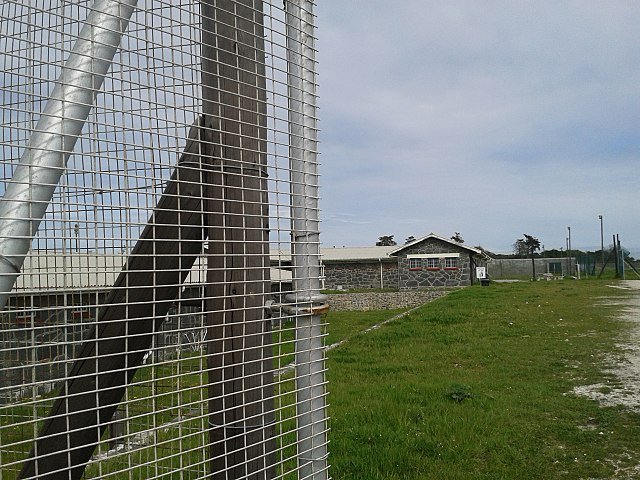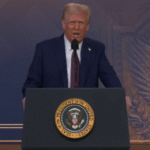Oscar Jenkins, a 33-year-old biology teacher from Melbourne, stood in a glass cage in a Luhansk courtroom, his face pale as a Russian-controlled court sentenced him to 13 years in a maximum-security prison on Friday. His crime: fighting alongside Ukrainian forces against Russia from March to December 2024. Captured in the Donbas region, Jenkins now faces a harsh future far from home, where his family, like his sister Emma, cling to hope. “He wanted to help people,” Emma said, her voice breaking. “He’s no mercenary.” As Jenkins’ verdict landed, Australia’s government condemned the trial, coinciding with President Donald Trump’s push for a Ukraine peace deal that remains elusive.
Russian prosecutors in occupied Luhansk accused Jenkins of being a mercenary, alleging he earned $7,400 to $15,000 monthly to fight for Ukraine. A video from December 2024, shared on Russian Telegram channels, showed Jenkins, hands bound, struggling to answer questions in Russian as captors struck him. The Kremlin insists mercenaries lack prisoner-of-war protections under international law, a stance Australia disputes. “Oscar is a full member of Ukraine’s armed forces,” said Foreign Minister Penny Wong, calling the trial a “sham” and demanding humane treatment. Jenkins, who joined an international brigade, was convicted of participating in an armed conflict against Russian troops.
The sentencing comes amid Russia’s ongoing war in Ukraine, launched in February 2022, which has drawn foreign volunteers like Jenkins to Kyiv’s cause. Australia, a staunch Ukraine supporter, has provided nearly $1 billion in aid and military training since the invasion began. Jenkins’ capture last December sparked fears for his safety, especially after false Russian reports claimed he was killed. “We thought we’d lost him,” Emma said, recalling the family’s relief when his survival was confirmed in January. Now, they face the agony of his long imprisonment, with Australia’s Prime Minister Anthony Albanese vowing to pursue “every avenue” for his release.
The trial’s context is fraught. Russia’s annexation of Luhansk in 2022, following a 2014 insurgency, set the stage for such prosecutions. Jenkins’ case echoes others, like a 72-year-old American sentenced to nearly seven years for similar charges in 2024. Ukraine’s ambassador to Australia, Vasyl Myroshnychenko, said Jenkins is on Kyiv’s prisoner-of-war list for potential swaps, but negotiations are complex. “He fought for freedom,” Myroshnychenko said. “We won’t abandon him.” Meanwhile, Trump’s recent talks with Russian and Ukrainian leaders have raised hopes for a deal, but no breakthrough has emerged, leaving Jenkins’ fate uncertain.
Reactions are visceral. In Melbourne, friends rallied outside Parliament House, holding signs reading “Free Oscar.” On social media, posts mourned Jenkins’ sentence, with one user writing, “He’s a hero, not a criminal.” Russian accounts, conversely, labeled him a “foreign gunman.” The Luhansk court’s images of Jenkins in the glass cage fueled outrage, with Wong urging the International Committee of the Red Cross to monitor his welfare. In Ukraine, soldiers who knew Jenkins described him as “quiet but brave,” stunned by his harsh punishment. “He stood with us,” said a comrade, speaking anonymously. “Now we stand for him.”
The consequences ripple beyond Jenkins. His family fears for his health in a brutal penal colony, where conditions are notoriously grim. Australia’s diplomatic push risks straining ties with Russia, already tense over sanctions. For Ukraine, losing foreign volunteers to such sentences could deter others, though Kyiv’s resolve remains firm. The war’s broader toll—thousands dead, cities ruined—looms over Jenkins’ story, with Trump’s peace efforts offering faint hope. A Moscow-based group suggested a prisoner swap involving Russian spies in Australia, but no deal is confirmed.
What’s next? Australia is working with Ukraine and the Red Cross to secure Jenkins’ release, possibly through exchanges like one in August 2024 that freed 24 prisoners. Russia shows no sign of relenting, with more trials of foreign fighters looming. In Melbourne, Emma Jenkins lights a candle nightly, praying for her brother’s strength. “He believed in justice,” she said. As the war grinds on, Jenkins’ fate tests the world’s will to protect those who fight for their beliefs. Will diplomacy or defiance bring him home?


















